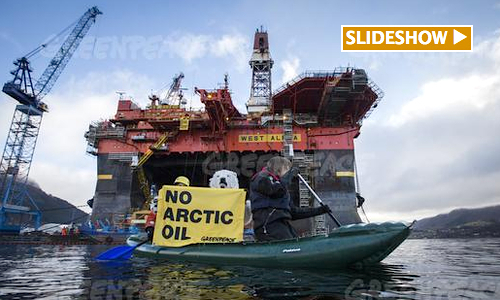
Activists Scale ExxonMobil Rig on 25th Anniversary of Exxon Valdez Oil Spill

Today, on the 25th anniversary of the Exxon Valdez oil spill in Alaska, Greenpeace climbers scaled an ExxonMobil rig destined to drill in the Russian Arctic. The activists are calling for a ban on offshore oil drilling in the Arctic and for renewed efforts to fight climate change.
“We are here today, on the 25th anniversary of the Exxon Valdez disaster, to protest against ExxonMobil’s plans of drilling in the Arctic,” said Ethan Gilbert, a U.S. activist who lived in Alaska when the disaster happened in 1989. “I was a young child living in Alaska when the Exxon Valdez disaster happened and the effects there are still being felt on the people and the environment even today. In the Arctic the effects would be even worse. We are here on behalf of over 5 million people who have joined the movement to protect the Arctic from oil drilling.”
Fourteen activists from seven different countries took part in the protest in Norway, where five of them scaled the West Alpha oilrig and unfurled a banner saying: “No Exxon Valdez in Russian Arctic.”
ExxonMobil plans to drill in the most extreme and remote area of the Arctic this year,” said Erlend Tellnes, Arctic campaigner with Greenpeace Nordic. “This is madness—if something goes wrong, they will be all alone in the far north, with rescue equipment located thousands of kilometers away. We need to stop all oil companies before they cause the inevitable spill in the Arctic, where the harsh conditions would make it impossible to clean up. Look at Exxon Valdez. It is still affecting Alaskan nature 25 years after the accident.”
ExxonMobil is the world’s largest oil company and has a multi-billion dollar joint venture with Russia’s Rosneft to explore for oil in the Kara Sea, a project that will start this summer. The drilling block where Exxon will operate overlaps with the legally protected Russian Arctic National Park, an area renowned for its magnificent wildlife. The area is home to polar bears and bowhead whales and includes walrus rookeries and one of the largest bird colonies in the northern hemisphere. According to Russian law it is illegal to drill for oil in the area.
“We can’t afford to risk an Exxon Valdez disaster in the Arctic, which would be impossible to clean up,” said Tellnes. “It is time to go beyond oil. We know that we have to keep these fossil fuels in the ground if we want to prevent further climate changes.”
The Arctic is one of the most extreme and hostile environments to drill for oil on the planet. The ExxonMobil drill site is covered by thick sea ice for 270-300 days of the year, whilst temperatures as low as -45 degrees Celsious are not uncommon. The Kara Sea is often battered by fierce storms and during the long northern winter is plunged into months of almost total darkness.
Visit EcoWatch’s WATER page for more related news on this topic.

 233k
233k  41k
41k  Subscribe
Subscribe 